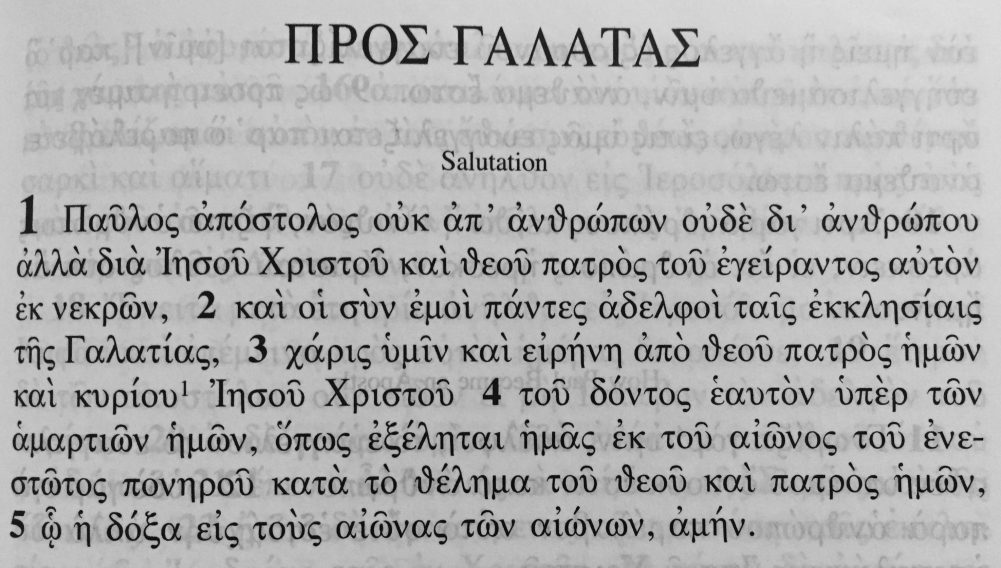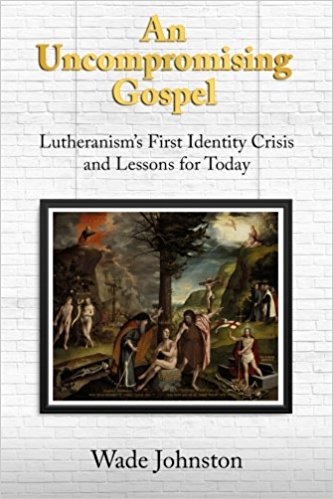Have you been a good Christian this week? I like to ask my students that sometimes. Where their minds go reveal a lot. Almost always, their minds go to their works, to their behavior, to the law. And that’s not bad. We should examine ourselves. That’s a most Christian and confessional thing. We do so before Absolution. We do so before taking the Supper. That being said, a good Christian, when all is said and done, isn’t measured by the law. Why? Because all who rely on the law to measure their standing with God—to assess whether or not they are Christian, are saved, are justified—are under a curse. Continue reading “Galatians 3:10-14”
Wingin’ It 13.1: An Uncompromising Gospel | Luther’s Heidelberg Disputation
Galatians 3:7-9
Christ saves. Christ justifies. And yet He does so through faith. Faith, however, is not our work, but His gift. Faith is the beggar’s hand that receives unearned merits, divine charity. Faith is not our decision. We do not become children of God by human will, as we are reminded in John 1. Faith is the product of God’s decision, His election, His choice. We are the beneficiaries. And this faith is not restricted by race, gender, age, or anything else. Jew and Gentile (all non-Jews) alike have been saved by grace through faith in Christ, and thus been sons of Abraham and sons of God. What a wonder! What a reason to support the ministry of the Word here among us as well as throughout the world through missions! Continue reading “Galatians 3:7-9”
Galatians 3:1-6
The Galatians made a good start. They had been properly taught and rightly believed that they were saved, forgiven, justified, only for Christ’s sake. And yet with the infiltration of false teachers and the arrogant nagging of the old Adam, they wavered. Yes, surely they were saved by grace and through faith in Christ, but they could play some part, even a small one, in that process, right? Continue reading “Galatians 3:1-6”
Episode 13: The Guys Talk Being Dads
A Father by Grace with and in the Father of Grace
Being a father comes with a lot of responsibility. I am expected to provide, protect, love, forgive, teach, correct, model, and all manner of such things. I mean, at least, I expect myself to do so, and my own father’s selfless love for me has set a pretty high bar. Add to that my heavenly Father’s example, and I have a near impossible task. Continue reading “A Father by Grace with and in the Father of Grace”
Galatians 2:17-21
In other words, if you could have saved yourself, there was no need for God to be on a cross. But God was on a cross, wasn’t He? Why? To save you, because you could not save yourself. And so we do well not to believe, live, or proceed as if God were not on a cross. Christians do not live under law and we do not live in sin. Christ has fulfilled the former and absolved the latter. We now love because He first loved us, serve because He served us, keep the Commandments, not because they are a guide to heaven, but rather because they are an expression of what pleases Him who has granted us heaven as a free gift, though not a cheap gift, costing Jesus His very life. It is, as Paul says, “no longer I who live, but Christ who lives in me,” so that “the life I now live in the flesh I live by faith in the Son of God, who loved me and gave himself for me.” Christ does not make us sinners by dying and rising for us, making plain our inability to keep the law perfectly, which is how it must be kept if it is to give life. No, we were already and have been sinners from conception. The law had plenty of which to accuse us and for which to condemn us even had Christ not exposed the depths of our fallen race’s and our own personal sin through His passion. What Christ has done, then, is stopped its mouth and pardoned us, justified us, declared us not guilty, all for His sake. He has become one with us, dwelling in us, working through us, renewing our will and bringing forth fruits of repentance in our actions. It’s all Christ or no Christ. There is no in-between, and comfort is found only in the Christ who is all in all, Alpha and Omega, advocate and judge, all for us. And so, may Christ and His Word dwell in your richly so that all things in your lives abound in Him, for Him, and through Him, to His glory, and sanctified in His name. Continue reading “Galatians 2:17-21”
Wingin’ It 12.1: Devotions on Galatians
Galatians 2:15-16
Harsh much, Paul? We were Jews from birth and not Gentile sinners? Well, isn’t that good for you, but what of the Gentile sinners? Who were the Gentile sinners? They were the very people whose freedom in Christ and whose justification by grace, through faith, without the works of the Old Testament Mosaic law, he is defending. So why call them that? Were not the Jews sinners? Surely they were. In fact, they were better sinners, because, while the law cannot save us—not because of its deficiency, but our own—it can certainly reform and refine us, so that we become reformed and refined sinners, better at hiding our impiety and putting up appearances. At this Paul’s foes were professionals. Paul is not looking down on the Gentiles whose salvation he defends and will in no way allow to be compromised with works of the law. No, Paul here is adopting the language of the legalistic Jews who were attacking the gospel and the Gentile’s legitimacy as Christians and children of God. These “Gentile sinners,” as such people would call them, Paul says are in fact the better Christians, not because they are any less sinners, but because they confess it and abandon themselves on Christ, His Word, and His righteousness for hope and salvation. Continue reading “Galatians 2:15-16”
Ivan’s Folly
One of the books I have some of my students read each semester is actually not a book, but a section from a much larger novel. It’s The Grand Inquisitor, which is from The Brothers Karamazov, a wonderful novel, though long, by Fyodor Dostoyevsky. Though no fan of Western Christianity, a devotee of Russian Orthodoxy, Dostoyevsky has some powerful insights into the human psyche and the aspects of human personality and energy that manifest themselves in everyone, although to different extremes. And so, to be very basic about it, three brothers Karamazov, Alyosha, Ivan, and Dmitri, represent three basic human drives: religion, reason, and sensuality. Continue reading “Ivan’s Folly”






